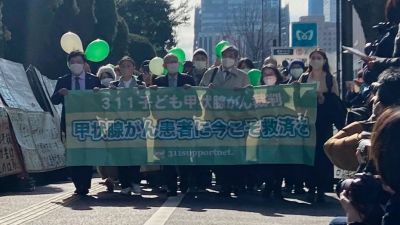Cancer patients sue nuclear plant operator over radiation from Japan's Fukushima disaster

Cancer patients, who were children during the 2011 Fukushima nuclear disaster, are suing the nuclear plant operator responsible as they say their illnesses were triggered by the radiation.
The six young adults, now aged 17 to 27, have since developed thyroid cancer and they are demanding a total of 616 million yen (£4 million) in compensation from Tokyo Electric Power Company Holdings, which runs the Fukushima nuclear plant.
One of the them, a woman in her 20s, said she was diagnosed with thyroid cancer in 2016 and has had to change jobs to prioritise her health.
She said: “I couldn't tell anyone about my cancer because I was afraid of being discriminated against.
"But I decided to come forward and tell the truth in hope of improving the situation for nearly 300 other people also suffering like us."
Their lawyers said it is the first group lawsuit in Japan filed by Fukushima residents over health problems linked to the nuclear disaster.
The plaintiffs, who were six to 16 years old at the time of the meltdown, were diagnosed with thyroid cancer between 2012 and 2018.
Four of them had their thyroid fully removed and need lifetime hormonal treatment. One of them says the cancer has since spread. The other two had part of their thyroid removed.
A magnitude 9.0 earthquake and tsunami destroyed the Fukushima plant’s cooling systems, leading to triple meltdowns.
The government was slow in its emergency response at the time, and evacuation in many places was delayed due to a lack of transparency about what was going on.
Residents trying to flee in their cars clogged roads and were stranded for hours. Some residents travelled in the direction of the radiation flow to evacuation centres.
After massive decontamination efforts, the government declared most areas safe. It is trying to counter “reputational damage” to local agricultural and fisheries products.
More than 290 people have been diagnosed with or are suspected of having thyroid cancer, including 266 in the Fukushima prefectural panel's survey of some 380,000 residents who were 18 or younger at the time of the disaster.
The occurrence rate of 77 per 100,000 people is significantly higher than the usual 1 to 2 per million, the plantiffs' lawyers say.
But officials and experts have blamed the high rate on overdiagnosis, which they say may have led to unnecessary treatment or surgery.
Lawyer Kenichi Ido said his client's cancer has progressed and that none of the cases involve overdiagnosis.
He pointed to the 1986 Chernobyl disaster, where several thousand cases of thyroid cancer linked to radiation exposure were reported, mostly in children.
He said cancer patients in Fukushima "live in uncertainty, and cannot even think about marriage or having children.”
Those speaking up are criticised for hindering the area's recovery efforts, he said.
Tokyo Electric Power Company Holdings apologised on Thursday and said the company will “respond sincerely” after examining court documents.
In a criminal trial of former company executives, the Tokyo District Court in 2019 found three top officials not guilty, saying they could not have foreseen the disaster. An appeal has been launched in a high court.